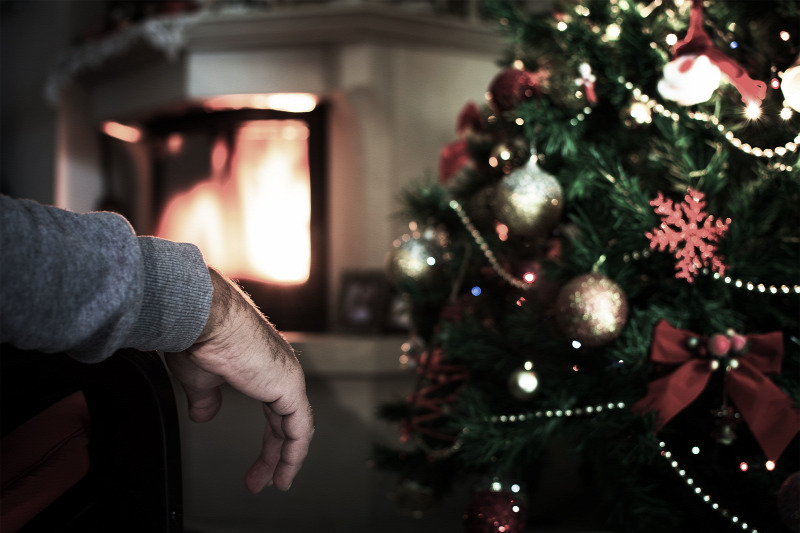Every twentieth pensioner not only does not benefit from the festive idyll, but does not even talk to anyone during Christmas. But they are not the only ones affected by loneliness. How to help ourselves and others?
A family cuddling under a Christmas tree floating in the light, the smell of bagels and fish juice made together - unfortunately, this is not what the holiday is about for everyone. There are many of us who are forced to spend the holiday of the year mostly about being together in cold solitude. The elderly are especially – but not exclusively – affected by this problem; surveys in the United Kingdom, for example, approximately one in twenty pensioners not only does not benefit from the festive idyll, but does not even speak to anyone during Christmas, while the pandemic has already thoroughly damaged our human relationships - and it would lead to far we would also like to point out that this year's Christmas is not only made worse by loneliness, but also by the coldness of poorly heated apartments for those who live alone, while all of this is in sharp contrast to the reality shown on TV or by many in social media.
Not to mention that we can feel endlessly alone not only when no one is around us, but also when there is no real depth in our defining relationships or we don't feel truly loved - this is social loneliness. Anyone who has experienced something similar knows that it is the most excruciating.
"Let's dare to talk openly to our friends and family members about feeling alone"
- advises psychologist Orsolya Szmolka. On the one hand, in this case we can connect with them - it's easy that they feel the same way - or they can recommend a program, perhaps one where we can even go together with them. If we talk about our loneliness to those close to us, there is a greater chance that we will remember it on Christmas Eve, and maybe they will be able to spend a quarter of an hour on the phone. "Lonely people very often fall into the trap of feeling sorry for themselves instead of taking action: "no one wants my company anymore", and they are tormented by a spiral of similar negative thoughts. So it's very easy to get involved in a vicious circle," he points out.
Instead of feeling sorry for yourself, the psychologist advises those who feel alone to, for example, join a charity organization as a volunteer.
"Helping others can bring back the feeling that I am a 'valuable member' of society"
- emphasizes Orsolya Szmolka. On the other hand, when joining the aid organization, we can experience that I am together with others and we work for a common goal. Not to mention the fact that we can experience while helping, no matter how crappy we feel, there are people who are even in a much crueler situation than us.
Don't be too lazy to decorate alone, get a row of burners, light a candle. All of these warm the human soul. You can even go to programs alone, there are plenty of options, from the Advent fair through programs organized by the church to cultural events. If we can financially afford it, let's go out on our own, a wellness weekend, an afternoon in an infrared sauna spa or even just a trip can spend a lot on us.
If it's not us, but someone else in our environment who is struggling with loneliness, then try to - as Orsolya Szmolka puts it - sneakily approach it, don't emphasize that you see, I'm your good friend, I'll go with you to the Christmas market for example. Let's invite our lonely friend over so that he feels that his participation is not a burden, but a help. For example: "unfortunately, I can't bake the cookies alone, could you help me?", or
"you are such a pro at carving a Christmas tree, will you come over?".
This way, you will definitely feel useful. During Advent and Christmas, let us pay special attention to those who may need us.
Myth: most people commit suicide at Christmas
According to popular belief, most suicides in the world occur at Christmas. It seems logical, since this is the holiday when we celebrate with our family, but unfortunately it is not given to those who live alone, so they can feel their lives are especially hopeless at this time. In addition, this is when we see the sun the fewest times of the year, which affects our serotonin levels: we tend to feel gloomy, and in the worst case, a depressive mood can knock on our door. The myth of a suicide wave around Christmas affecting lonely people has been refuted by research : the number of people who end their lives by their own hands is not only increasing, but also decreasing. In fact, on the day after Christmas, the indicator drops significantly, at this time
on average, 15 percent fewer people commit suicide
in the United States.
This trend can also be observed here: the number of suicides is the highest in June-July and the lowest in the months of December-January - according to the data of the Central Statistical Office (KSH) between 1970 and 2010. By the way, this phenomenon occurs equally in both sexes, due to the much lower number of female suicides, the curve of the rise is smoother in the summer months. The fall increase in women, indicated in some places in the literature, was not detectable in Hungary. According to the experts, there is nothing surprising about this, as more people typically have social connections around Christmas, which is a protective factor against suicide. Incidentally, psychiatric hospital admissions also decrease during this period.
In other words, it can be seen: social relationships, which in such cases play a prominent role, deter many people from the worst solution who would otherwise be inclined to do so. In other words, if we go one step further and pay a little more attention to our fellow human beings not only at Christmas, we will not only share the holiday's rapidly flaring light with others, but we can even save lives.
Featured image: Shutterstock












